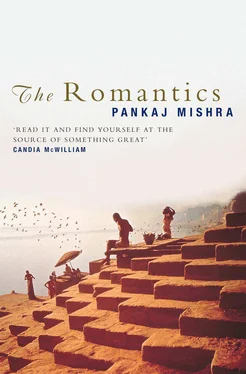Pankaj Mishra - The Romantics
Здесь есть возможность читать онлайн «Pankaj Mishra - The Romantics» весь текст электронной книги совершенно бесплатно (целиком полную версию без сокращений). В некоторых случаях можно слушать аудио, скачать через торрент в формате fb2 и присутствует краткое содержание. Год выпуска: 2001, Издательство: Anchor Books, Жанр: Современная проза, на английском языке. Описание произведения, (предисловие) а так же отзывы посетителей доступны на портале библиотеки ЛибКат.
- Название:The Romantics
- Автор:
- Издательство:Anchor Books
- Жанр:
- Год:2001
- ISBN:нет данных
- Рейтинг книги:4 / 5. Голосов: 1
-
Избранное:Добавить в избранное
- Отзывы:
-
Ваша оценка:
- 80
- 1
- 2
- 3
- 4
- 5
The Romantics: краткое содержание, описание и аннотация
Предлагаем к чтению аннотацию, описание, краткое содержание или предисловие (зависит от того, что написал сам автор книги «The Romantics»). Если вы не нашли необходимую информацию о книге — напишите в комментариях, мы постараемся отыскать её.
The Romantics — читать онлайн бесплатно полную книгу (весь текст) целиком
Ниже представлен текст книги, разбитый по страницам. Система сохранения места последней прочитанной страницы, позволяет с удобством читать онлайн бесплатно книгу «The Romantics», без необходимости каждый раз заново искать на чём Вы остановились. Поставьте закладку, и сможете в любой момент перейти на страницу, на которой закончили чтение.
Интервал:
Закладка:
The other woman accompanying Mark was his girlfriend, a snub-nosed woman called Debbie. Short and squat, she looked a diminished figure beside the tall and sturdy Mark. She wore long silver earrings over a slightly ill-fitting white cotton sari; extravagantly curled Indian clips kept her frizzy blonde hair pressed to each side of her forehead. She spoke very fast; her sentences ended with a nervous giggle and an inquisitive gaze.
I helped Miss West set out the food on brass plates: dhal, tandoori chicken, matar paneer, puris and saffron-scented basmati rice. Miss West said, ‘Where’s Catherine? She’s always late, the poor girl,’ as she went around pouring the bhang-laced, thick, creamy thandai from a brass jug into clay cups I had bought at a nearby tea stall earlier that day. Everyone except myself drank the lassi (Miss West said, ‘Are you sure you won’t have any? You are a real Brahmin, aren’t you?’ and Debbie turned to look appraisingly at me). It didn’t take long for the cannabis to take effect. The voices and laughter grew louder; people grew careless in their postures: Mark slumped against a bolster, his back to the river and its fickle late-evening traffic of tourist-laden boats, and Sarah was half-recumbent on the white sheet, her thandai cup precariously perched upon her stomach. Several conversations grew around me.
I overheard bits of the conversation between Debbie and Sarah. Debbie was saying: ‘You know, I met this really peculiar man at the Taj yesterday. Mark knows him; he’s an Indian scholar of some sort, called Prasad. . Anyway, he started asking me all kinds of really aggressive questions about Buddhism. . and, you know, I could tell what he was thinking inside. . something like, “What’s wrong with this woman? Why’s she a Buddhist?” etc., etc. I didn’t like him at all. He sounded like a real jerk with his. . sort of British public-school accent. .’
‘How did he know you were interested in Buddhism?’ Sarah asked.
‘Well, he asked me what my religion was.’
‘What did you say?’
‘Well, just that I was raised a Christian, but I’m now thinking of converting to Buddhism.’
‘What else did he say?’
‘Nothing much really.’ Debbie seemed to lose interest in the topic. ‘He really ignored me altogether and started talking to Mark about how people in the West had completely misconstrued Buddhism and how. . unequipped the Western mind is to receive a philosophy of negation and how people can only be — his phrase was — “part-time Buddhists”. I thought he was being totally ridiculous. So. . Oh, yes! He also asked me if I had read Hermann Hesse. I said, “Who hasn’t?” And he said, “So did Siddhartha inspire you to come to India?” It was really condescending.’
Anand was telling the tabla player about the concert he was giving in Paris next year. ‘Good money,’ he said, in Hindi. ‘When I come back I want to open up a school for sitar players, free training, free meals, everything.’
Mark was discussing with Miss West his plans to go back to America and get ‘serious’ about Debbie. ‘I don’t want to be a rolling stone all my life,’ he said. ‘You know, one of the great things for me about coming to India has been knowing about poverty and pain and suffering, and realizing that there is a whole world outside America where people don’t even have the basic things in life. I mean, you keep seeing all those things on television, you know, those starving kids in Africa, but somehow you never get close enough to really feel it. It doesn’t register much. It’s just out there on a map and you never really care as much as you should. And then you see it face to face and, boy, it knocks you out. I feel I have been lucky in this respect both as an artist and a human being. Not many people get the chance to experience all this. Back home we are kind of trying to forget what pain and suffering are. . keep. . covers. . only. . real life. . winners and losers. . this. . machismo. . makes. . pathetic failures. I mean spiritually, because we don’t allow ourselves to suffer, experience pain. What I want to do when I get back is find a way of sharing my experience of Benares, and find some way of integrating it into daily life.’
Miss West, who had given the impression of listening carefully until now, suddenly jerked her head up. ‘I am frightfully sorry, but I simply must attend to the garland situation,’ she said and walked away briskly. Mark watched her go, and then shook the ice cubes in his glass before draining his drink.
All around me, people continuously spoke, laughed, ate, drank; and watching them, I became increasingly aware of the strangeness the occasion held for me. Was this what always went on at parties, I wondered: the easy exchange of confidences, the casual display of personality, the quick amiability and seemingly inconsequential chatter about things that appeared important.
It all seemed to be an esoteric ritual, and I took no part in the conversation. I didn’t want to say the wrong thing, and had no clear idea of what the right thing was. I did once ask Debbie — safely following Mark, who had asked me the same question — what she was doing in Benares. Passing through, she said, and gave her short nervous giggle, and I was so struck by her reply that I could not add anything more to my question.
*
At some point in the evening, a tall striking girl wearing a blue embroidered Kashmiri kaftan appeared on the roof. I knew it was Catherine. I had heard of her from Miss West, who was frank in her disclosures about people she knew in Benares, and even franker about people she considered her protégés, such as Catherine and Anand. It was hard not to be distracted by Catherine’s extraordinary beauty. Miss West had said, ‘She’s very pretty.’ I was struck then by this way of looking at women. ‘Pretty’: it wasn’t a word much used for women in the world I had known, where even the most beautiful women were kept unaware of their advantage. Women were obedient daughters, dutiful wives and devoted mothers; they weren’t ever considered outside these roles. Now I looked at Catherine in the light of Miss West’s remark, and the word ‘pretty’ came to be crystallized by the lovely vulnerability of her face, the clear olive skin, the large hazel eyes that looked out at the world with a mixture of uncertainty and sadness, the full lower lip, the dark wavy hair that formed a perfect inverted V over her forehead. After this, her soft French accent was all the more unexpected; it made her seem oddly childlike, more human, more manageable.
Catherine’s father was a leading banker in Paris, and she had come to Benares in order to get as far away as possible from her oppressively ‘bourgeois’ parents — this deployment of a word I had previously encountered only in Marxist texts was new to me. In Benares she had fallen in love with Anand, whom she had met at one of Miss West’s musical soirées. They lived together in a nearby riverside house. At the end of the winter Catherine planned to take Anand back with her to Paris, where he would attempt to make a living out of performances and studio recordings while Catherine finished her philosophy degree.
Miss West made the introductions. Again, I was presented as the tireless autodidact. Catherine smiled and asked me the predictable question about my current reading. I told her. ‘Turgenev? Oh, he’s wonderful,’ Catherine exclaimed. ‘All those country-house settings and passionate people. But I haven’t read that book. Will you lend it to me?’ ‘Yes,’ I found myself stammering, ‘yes.’
Miss West said, in that unnaturally loud and tense voice I had heard for the first time that evening, ‘Shall we have some music now?’ She looked around, anxiously. ‘Shall we? Shall we?’ she repeated. People interrupted conversations to nod weakly at her, and began reluctantly to move towards settling themselves on the two large bolster-strewn mattresses that had been placed directly opposite the musicians. The sitar and the tablas were unpacked and tuned. As everyone applauded, Miss West garlanded the musicians, put vermilion dots on their foreheads and placed several incense sticks and diyas before them.
Читать дальшеИнтервал:
Закладка:
Похожие книги на «The Romantics»
Представляем Вашему вниманию похожие книги на «The Romantics» списком для выбора. Мы отобрали схожую по названию и смыслу литературу в надежде предоставить читателям больше вариантов отыскать новые, интересные, ещё непрочитанные произведения.
Обсуждение, отзывы о книге «The Romantics» и просто собственные мнения читателей. Оставьте ваши комментарии, напишите, что Вы думаете о произведении, его смысле или главных героях. Укажите что конкретно понравилось, а что нет, и почему Вы так считаете.












